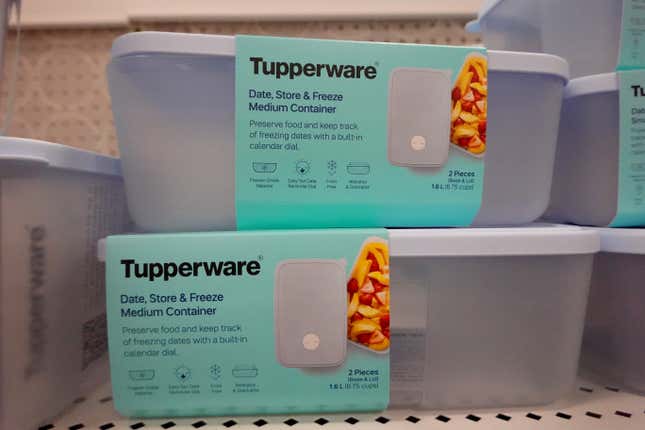Tupperware stock plummets 57% because it plans to file for bankruptcy

In This Story
Tupperware Brands (TUP) is set to file for bankruptcy sometime this week after struggling for years to revive its business amid declining interest in its products. Shares of the home goods company plummeted by 57% during late-hours trading on Monday.
Nvidia isn’t the top stock anymore. A strategist says buy this instead
Bloomberg, citing individuals familiar with the matter, said the Florida-based company plans to seek court protection after violating its debt terms. Tupperware has consulted advisers to help it through the proceedings, the magazine said.
Plans are still tentative and may change. The development follows extensive negotiations with lenders over managing $700 million in debt. Although lenders offered some relief this year, the 78-year-old retailer’s situation continued to worsen, the individuals who preferred to remain anonymous said.
Tupperware, known widely for its plastic food containers and other kitchen appliances, has faced significant challenges staying afloat. In June, the home goods company said it would close its last U.S. facility by January 2025, and lay off over 140 employees starting Sept. 28.
In April 2023, Tupperware stock closed down nearly 50% after the company warned that it could be going out of business.
Last year in October, Tupperware overhauled its leadership, replacing CEO Miguel Fernandez with Laurie Ann Goldman, the former chief executive of underwear maker Spanx.
Tupperware’s bankruptcy plans come at a time when other well-known retailers also face their own financial struggles, including Big Lots (BIG), Red Lobster (TU), and Express.
These high-profile bankruptcies reflect broader issues in the retail sector, including economic pressures, heavy debt, shifting consumer preferences, and intense competition. Many companies are being forced to make difficult decisions, such as closing stores and reducing staff, in their efforts to restructure and survive.

Comments are closed.